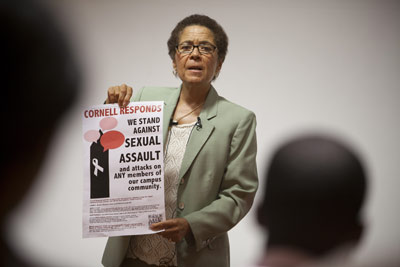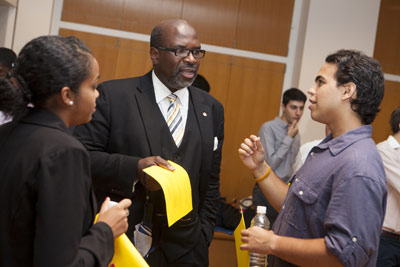Student leaders brainstorm about campus issues
By Mikhail Yakhnis


After recent racial bias and sexual assault incidents on campus, Associate Dean of Students Renee Alexander couldn't help but wonder if these situations would have been handled more effectively had there been a dedicated forum where students of different backgrounds and interests could communicate.
On Sept. 8 student leaders from more than 20 organizations, including Sigma Pi fraternity, the Cornell Asian Pacific Student Union, Cornell Hillel and Black Students United, convened the inaugural Leadership Roundtable to manifest such an idea. The monthly roundtable -- which had been scheduled before the recent incidents occurred -- was the result of discussions Alexander had held with student leaders over the summer on how to best develop strong communications networks among student groups.
Alexander opened the forum by noting that there is "only so much the leaders of this university can do when we have student problems. ... The composition component [of the student body] is complex. There are so many differences ... and it's really hard to get a voice, one voice. But with this diversity of leadership here, you've got all those different components of the community in this room."
She called on the student leaders to work together to discuss the complex issues facing the university today, reminding them of the power they hold: "You have clout, you have heft, you have followers in your community," she said.
After Alexander's introduction, the student leaders heard from staff members from the Office of Alumni Affairs on the roles alumni can play in enriching the student experience. Alumni "can really be wonderful assets, wonderful resources for all of you," said Corey Earle '07, associate director of student and young alumni programs in the Office of Alumni Affairs.
Alumni are usually eager to work with students, said Margaret Gallo '81, senior director of Class, Student and Young Alumni programs. "It's what we hear [from alumni] over and over and over again: 'We want more interaction with students,'" she emphasized. Gallo noted some of the benefits for increased cooperation: "[Alumni] can be incredible mentors, they can provide internships, jobs, certainly advice."
The ways in which student organizations can be involved with alumni served as a segue into the final part of the roundtable, small-group discussion around two fictional case studies: one of bias intimidation involving a transgendered student and the other dealing with unequal funding of student groups.
"The Leadership Roundtable is an initiative designed specifically to gather student leaders from across campus and bring them together to think, brainstorm, advise and problem-solve," Alexander had previously noted in an email. It will meet once a month for dinner and discussion, but "be ready on short notice when conflict, controversy or emergencies arise," she wrote.
"We need to work together more as a community and communicate with each other ... to make sure we have a common understanding," said Danya Contreras '13, co-president of La Asociacion Latina, at the roundtable. Geoffrey Block '14, an at-large representative for the Student Assembly, agreed, but warned that "the conversation can't end here."
Now that the student leaders will have monthly meetings and plenty to think about, Alexander has ensured it won't.
Mikhail Yakhnis '14 is a writer intern for the Cornell Chronicle.
Media Contact
Get Cornell news delivered right to your inbox.
Subscribe